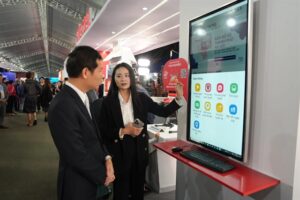9th Global Conference of Young Parliamentarians begins in Hanoi

Hanoi, The Gulf Observer: The 9th Global Conference of Young Parliamentarians, hosted by the National Assembly of Vietnam and the Inter-Parliamentary Union (IPU), has opened in the capital city of Hanoi, Vietnam, on Friday with the theme “The role of youth in accelerating the achievement of the SDGs through digital transformation and innovation.”
The conference during September 14-18 gathers nearly 500 delegates, including 300 international delegates from 70 IPU member parliaments and international organisations, making it the biggest one since the conception of the Global Conference of Young Parliamentarians.
The conference – encompassing three primary sessions “Digital Transformation,” “Innovation and Startups,” “Promoting Respect for Cultural Diversity in Support of Sustainable Development” – takes place as political, economic and societal upheavals have set back the progress of fulfilling Sustainable Development Goals (SDGs) commitments and climate change response in many countries. The trends of digital transformation, green transition, and innovation are increasingly given priority and promoted around the world.
In his opening remarks, Vietnam’s National Assembly Chairman Vương Đình Huệ said the organisation of this conference highlights Vietnam’s priority and concern for youth and global youth-related issues of today.
The Vietnamese top legislator also quoted President Hồ Chí Minh, the late founding father of Vietnam, in saying that “Youth is the future master of the nation. The prosperity or decline of the nation largely depends on youth.”
“Young people are the driving force and the bearers of “historical responsibilities” in the international integration and national development efforts of each country as well as global prosperity,” Chairman Huệ said, asking the young parliamentarians to utilise their intelligence, youth, creativity, and enthusiasm to contribute positively to the success of the conference.
National Assembly Chairman Vương Đình Huệ asked the delegates to pay attention to five key points during their discussions and debates.
First, what needs to be done and how to comply with and uphold international law and the United Nations Charter, as a crucial condition for the maintenance and nurturing of peace, cooperation, and sustainable development.
Secondly, the role of developed countries, international organisations, business communities, and youth in addressing global issues such as sustainable and secure digital transformation, just energy transition, adaptation to climate change, and robust promotion of entrepreneurship and innovation.
Thirdly, making people and businesses truly the centre of all policies in the development process, both as the objective and as the motivation and fundamental resources.
Fourthly, leveraging the values of culture and human beings in sustainable development, promoting the respect for cultural diversity in the context of the Fourth Industrial Revolution, and enhance cooperation in innovating the operation of the economy, increasing labour productivity, and creating new momentum for economic growth. At the same time, this will help government agencies become more transparent and efficient on the digitalisation path, narrowing the development gap, and ensuring national sovereignty and individual privacy in cyberspace.
And lastly, Chairman Huệ also proposed that the IPU explore the establishment of a global network of young parliamentarians dedicated to innovation, allowing them to exchange experiences and learn from one another.
IPU President Duarte Pacheco in his remarks thanked the Vietnam National Assembly for “providing an exceptional setting for the IPU meeting,” and expressed his appreciation towards Vietnam’s “commitment to leading by example on youth empowerment.”
“While we are behind with the SDGs, we are supercharging progress in technology, we need to link this progress in technology with the work being done to achieve the SDGs. Digitalisation and innovation are important opportunities.”
He also urged the responsible use of technology and innovation. “Technology should not force us into a one-size-fits-all model. Our global community has many traditions, languages, and perspectives. This diversity makes our lives richer and can also take us to greater innovation When we combine the power of technology with cultural diversity and ethics, we open up creativity and problem-solving.”
“As members of parliaments, we must promote inclusivity, intercultural dialogues, and respect for diversity as drivers of sustainable development and peace.”
Martin Chungong, secretary general of the IPU, underscored the significant roles young parliamentarians, and the young people that they represent, can play, calling them the “main champions who can be at the vanguard of this transformation.”
“You can be a driving force for progress, injecting fresh perspectives, energy, and innovative solutions into parliamentary processes. Sharing practices, amplifying your voices on the issues that concern you most, and better connecting you to youth, is what this Conference is all about.”
He remarked that the young’s “passion, enthusiasm, and dedication to accelerating the SDGs through digital transformation and innovation are a guiding light for us all.”
The IPU Secretary General also took the occassion to remind that young women are still underrepresented in the parliaments, adding that the contributions of young women are crucial to accelerate the SDGs through digital transformation and innovation.
Dan Carden, member of the UK Parliament, President of the Board Forum of Young Parliamentarians, said the young parliamentarians have a valuable role to play in supporting the next generation of tech-savvy and problem-solving youth, working towards sustainable development and peace, for example, through influencing their country to invest more in education for young people, especially to boost digital skills, science; training in transitioning to clean technologies, green jobs ; channeling youth voices from the grassroots up through the parliament bodies, especially when laws related to digital transformation are being examined; and facilitating the transition from education to employment.


